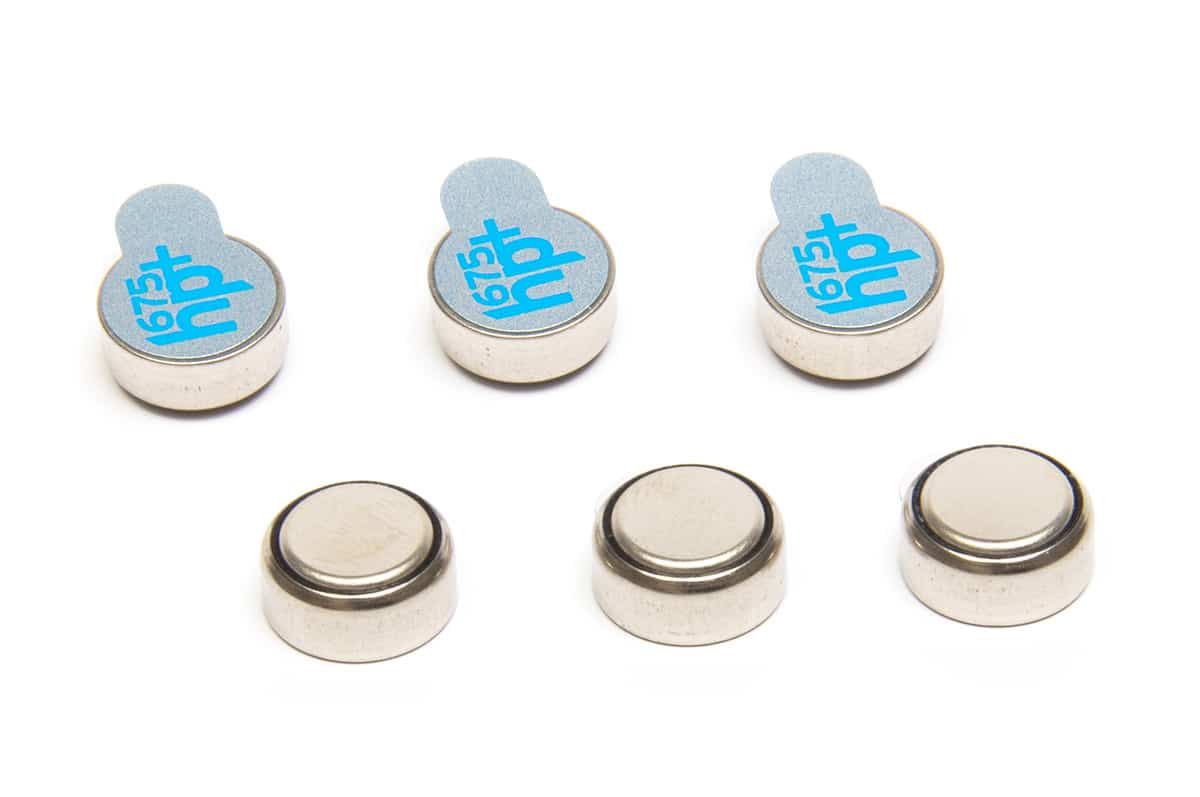MED-EL
Published Aug 06, 2014 | Last Update Mar 06, 2023
What Batteries Should I Use With My Cochlear Implant?

There are a few questions that we hear a lot, and one of them is “what kind of batteries should I use?” If you’ve ever asked yourself this question, here’s some information about cochlear implant batteries to help you decide which ones are right for you.
Zinc-Air, Silver-Oxide, Alkaline, Rechargeable: What’s the Difference?
There are lots of different batteries out there, so why would you choose a specific one for your cochlear implant’s audio processor? It’s because there are subtle differences between each style. The two main differences are battery size and cell type.
The size is what indicates if a battery will fit in your audio processor, and is named with a letter or number. The most common battery size for cochlear implants is 675. The batteries that we talk about in this article are all available in size 675, excepting the custom-made MED-EL DaCapo battery.
The cell type is another name for what fuel the battery uses, and common cell types include zinc-air, silver-oxide, alkaline, and rechargeable.
Zinc-air batteries pack a lot of power in a small size and are relatively inexpensive to produce. This makes them a good choice for general use when you want a single set of batteries to last a long time. However, they need to be in constant contact with oxygen to provide power and will start working as soon as you pull off the little tab, and will keep working as long as. When the zinc in the battery has completely oxidized it will stop producing power and the battery will need to be replaced. Depending on which audio processor and battery pack you use, a set of zinc-air batteries will last for approximately 60—90 hours.
Silver-oxide and alkaline batteries also work with cochlear implants. Both of these are powered by a chemical reaction inside the battery and therefore don’t need air to function. Individual batteries might be cheaper than their zinc-air equivalents, but they won’t last as long and have a lifetime of approximately 6—8 hours per set depending on your audio processor and battery pack.
Rechargeable batteries are also available in size 675. These batteries don’t need air to work and can be recharged multiple times. Current rechargeable 675 batteries will last approximately 6—8 hours per charge, again depending on your processor and battery pack.
Another type of rechargeable battery is the MED-EL DaCapo. It has its own battery pack that can be used with the OPUS 2 or RONDO and provides up to 16 hours of battery life.
SONNET users have two rechargeable battery options: the Standard and Micro battery packs. These lithium-ion batteries provide up to 10 or 7 hours of battery life, respectively.
How Much Power is Enough Power?
A battery’s power is measured in a few different ways: voltage, current, and capacity. You can think of it by imagining water flowing through a garden hose: voltage is like the water pressure, and it is measured in volts (V); current is like the volume of water going through the hose, and it is measured in amperes (A); capacity is how much water there is to go through the hose, and it is measured in milliampere hours (mAh). Depending on their size and cell type, different batteries provide different amounts of power.
Cochlear implants work best when used with high-power batteries, because high-powered batteries can give more current especially over a long period of time. If you’ve worn hearing aids before and are used to buying “hearing aid batteries”, know that these might not be powerful enough for a cochlear implant.
Lots of different battery brands offer high-power batteries but one brand’s “high-power” might not necessarily be the same power as another brand’s “high-power”. So, the best thing to do is look for batteries that say they are specifically designed for cochlear implants.
So, What Batteries Should I Get?
Ultimately it depends on your specific situation. Do you live where disposable batteries are expensive or not easily available? Then rechargeable batteries might work for you. Do you want batteries that will last a long time so you don’t have to change them as frequently? Then zinc-air batteries might be for you. Do you not have access to zinc-air batteries, or need batteries that work without air? Then rechargeable, silver-oxide, or alkaline batteries might work for you. And, depending on where you live some insurance plans include battery subscriptions so you don’t have to choose.
If you use WaterWear, you’ll also need to use batteries that work without air because it creates an airtight and watertight seal around your audio processor. Rechargeable, silver-oxide, or alkaline batteries all work well with WaterWear.
So while we don’t recommend a specific battery brand, there are a few different brands of batteries for cochlear implants that you can choose depending on the type of battery you want.
- Zinc-air: PowerOne, ZeniPower, Rayovac
- Alkaline: Duracell
- Silver-oxide: VARTA
- Rechargeable 675: PowerOne
A good idea would be to test out a few different battery brands and types to find out the ones that work best for your specific situation.
Have you heard about SONNET 2? Discover how our latest cochlear implant audio processor is made for you.
MED-EL
Was this article helpful?
Thanks for your feedback.
Sign up for newsletter below for more.
Thanks for your feedback.
Please leave your message below.
Thanks for your message. We will reply as soon as possible.
Send us a message
Field is required
John Doe
Field is required
name@mail.com
Field is required
What do you think?
Bruce Cooke
March 02, 2024
After many years of using Med-El replaceable batteries for my Sonnet processor and having them covered by Medicare, I now have 2 Implants and now use twice as many batteries. At the same time, I am now being told by Med-El that I must submit my own claim to Medicare using a form they supplied. I filled it out and sent it as directed, and Medicare will not process my claim because it lacks Doctor’s information. They also say that the provider is required to submit the application. What is going on? I have paid $40+ for 2 months now for something I never paid for previously. I am not happy!
MED-EL
March 27, 2024
Bruce, thank you for your comment and feedback. Your local MED-EL team will be happy to provide a quick guide and information on filling out the form. You can get in touch with them via this email: customerservice.us@medel.com Kind Regards
M Mckelvey
May 10, 2024
How do I order my cochlear implant batteries from
MED-EL
May 14, 2024
Hi there, thanks for your comment. For any questions regarding product pricing and purchasing, we recommend getting in touch with your local MED-EL team via this form: https://www.medel.com/contact-med-el Kind regards, Gordana
Sandra Pinney
August 31, 2024
I wear a Nucleus 7 processor and going in to hospital and would like some disposable batteries in case I can not charge the ones I have, which ones are suitable and where can I buy them. Kind regards. Sandra
MED-EL
September 02, 2024
Hi Sandra, it seems like you don't own a MED-EL device. Please contact the customer service of your processor's company, they will be able to answer your question. Kind Regards, Giulia
Tim Gehrmann
February 13, 2026
Is the cochlear battery enclosed for charging inside like a hearing aid. Or is the battery separate?
MED-EL
February 16, 2026
Hi Tim, thank you for your question. You can use both rechargeable and disposable batteries for charging your SONNET series audio processor. In both cases, please reach out to your local MED-EL team for any information about product availability and purchasing in your country. You can do so via this form: https://www.medel.com/contact-med-el. Kind Regards
Susie McGlothan
February 18, 2026
My dad has had his cochlear implant since 2007. It truly has been life changing. We are thankful his costs were covered by insurance and took for granted his auto delivery of cochlear batteries every few months. Life was so much easier when all of this was handled by Med-El! Now, I order from Amazon and don't even attempt to submit the receipts to Medicare and his supplemental insurance because I know they are going to make it a hassle to pay for what they should be paying for. It really is disappointing you cannot provide this courtesy to your implant users anymore.
MED-EL
February 19, 2026
Hi Susie, thanks for reaching out. We are glad to hear of your father’s long-term success with his MED-EL cochlear implant and appreciate your feedback about insurance coverage for disposable batteries. We have shared it with MED-EL US. In the meantime, please reach out to your customer service representative if you would like to explore rechargeable battery options as an alternative to purchasing disposable batteries out of pocket. Kind regards
MED-EL



Conversation
5 Comments